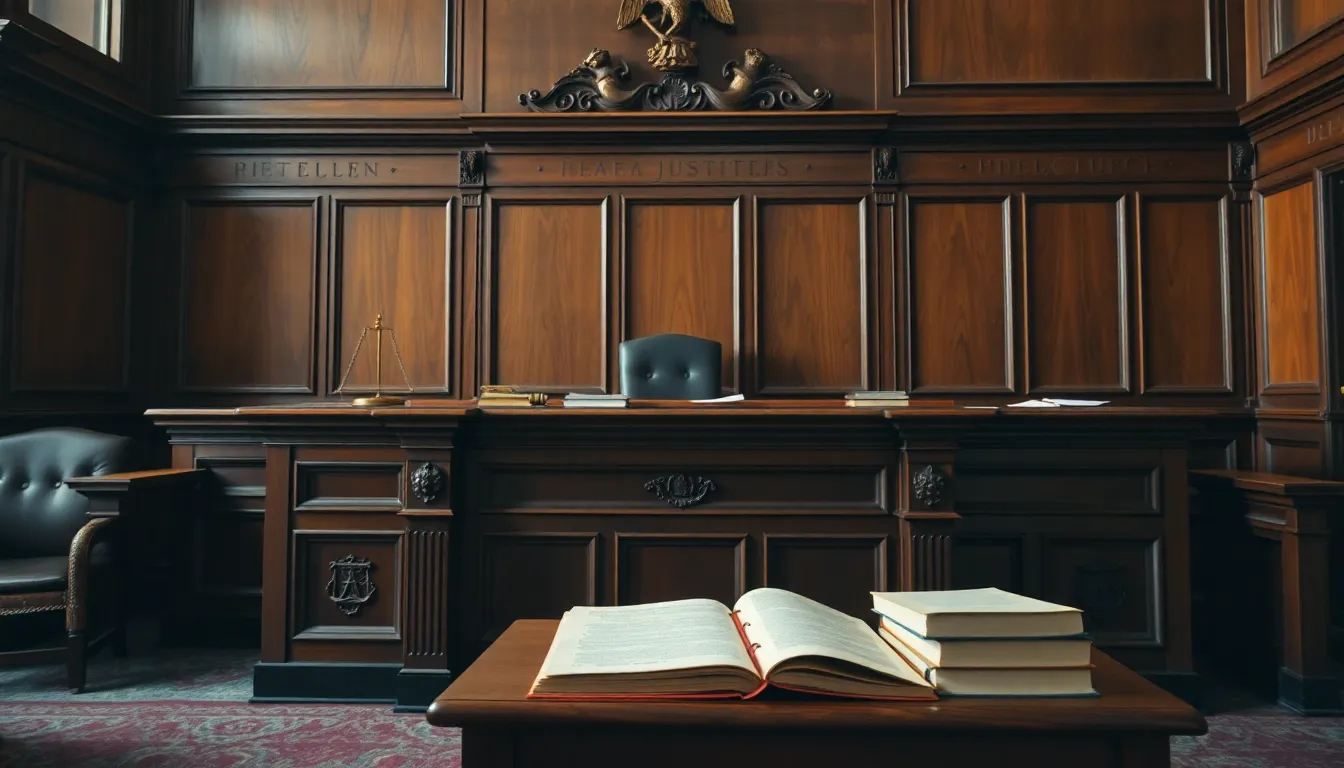Imagine being locked away with no clue why or how long you’ll be stuck there. Sounds like a bad plot twist in a thriller, right? Enter habeas corpus, the legal superhero that swoops in to save the day! This Latin phrase, meaning “you shall have the body,” is more than just a fancy term for law nerds. It’s a crucial safeguard against unlawful detention, ensuring that everyone has the right to challenge their imprisonment.
In a world where freedom is the ultimate goal, understanding habeas corpus is like having a secret weapon in your back pocket. It’s not just about legal jargon; it’s about protecting individual rights and keeping the justice system in check. So buckle up as we dive into the fascinating world of habeas corpus and discover why this powerful principle matters more than ever.
Table of Contents
ToggleWhat Is Habeas Corpus Mean
Habeas corpus refers to the legal right that allows individuals to challenge unlawful detention or imprisonment. This principle operates as a safeguard against arbitrary arrest. The term translates from Latin to “you shall have the body,” highlighting the requirement for authorities to present a detained individual before a court. Courts evaluate the legitimacy of the detention during a habeas corpus proceeding.
Living without the fear of wrongful imprisonment is crucial for maintaining personal freedoms. A habeas corpus petition typically asserts that a person is being held without sufficient legal justification. Legal professionals often invoke this principle in cases of unlawful detention, especially under circumstances involving government authority.
The right to file a habeas corpus petition exists as a cornerstone of civil liberties in many jurisdictions, including the United States. Individuals may leverage this principle to contest their incarceration or that of others. Legal precedent underscores its significance in ensuring fair treatment under the law.
Judges possess the power to review the evidence supporting the detention. Should they find the legal basis inadequate, they may order the release of the individual. Habeas corpus serves as a vital check on governmental power, reinforcing the idea that detention must always abide by the law. Understanding habeas corpus contributes to a well-rounded knowledge of individual rights and justice.
Results from habeas corpus cases can vary widely depending on the jurisdiction and circumstances. Procedural requirements often dictate the success of petitions, making legal guidance essential. By establishing a clear pathway for challenging detention, habeas corpus underscores the commitment to justice and lawful governance.
Historical Background

Habeas corpus has a rich historical context that emphasizes its legal significance. This principle traces its roots back to the Magna Carta of 1215. The document laid the groundwork for modern legal protections by establishing limits on royal authority.
Origin of Habeas Corpus
The term “habeas corpus” originates from the Latin phrase meaning “you shall have the body.” This legal principle first appeared in English common law during the 12th century. Early cases involved the king’s court ensuring that individuals were not unlawfully detained by local officials. Recognition of this right allowed individuals to challenge their imprisonment, paving the way for expanded personal liberties.
Development Over Time
Over the centuries, habeas corpus evolved through significant legal reforms. The Petition of Right in 1628 further solidified protections against arbitrary detention. Additionally, the Habeas Corpus Act of 1679 established critical procedural safeguards for detainees. As societies developed, many countries adopted variations of habeas corpus to protect individual rights. The continuous judicial interpretation and application in various jurisdictions demonstrate its adaptability in safeguarding civil liberties.
Legal Definition of Habeas Corpus
Habeas corpus serves as a fundamental legal principle that safeguards individual freedom from unlawful confinement. This principle mandates that authorities bring detained individuals before a court to assess the legitimacy of their detention.
Key Legal Principles
Habeas corpus focuses on several essential legal principles. It embodies the right to challenge unlawful imprisonment, allowing individuals to seek judicial review. Courts evaluate whether the detaining authority possesses sufficient legal justification for the confinement. This process ensures a check on government power, reinforcing the necessity of due process. Additionally, the burden of proof lies with the state, compelling authorities to substantiate the reasons for detention. Legal standards surrounding habeas corpus may vary by jurisdiction, highlighting the significance of procedural adherence.
Importance in Law
Habeas corpus plays a pivotal role in protecting civil liberties. This principle acts as a safeguard against arbitrary detention by ensuring that individuals can contest their imprisonment. Legal professionals often invoke habeas corpus to uphold justice. Without such protections, the potential for abuse of power increases significantly. Courts’ decisions in habeas corpus cases reflect vital interpretations of individual rights, influencing broader legal standards. A robust understanding of habeas corpus empowers individuals and emphasizes the importance of lawful governance.
Habeas Corpus in Practice
Habeas corpus serves as a vital mechanism for individuals to contest unlawful detention. Legal processes vary by jurisdiction, emphasizing the need for legal expertise in navigating these complexities.
How Habeas Corpus Works
Habeas corpus operates through a formal petition filed by an individual or their legal representative. A court must then evaluate the legitimacy of the detention. Courts examine evidence provided by the state while assessing the reasons for confinement. Within this process, judges hold authority to order a release if sufficient justification fails to meet legal standards. The fundamental principle ensures that individuals cannot simply vanish into the justice system without oversight. Detained individuals gain the right to seek a just resolution, reinforcing personal freedoms.
Landmark Cases
Several landmark cases have shaped the interpretation and application of habeas corpus. One notable example, Boumediene v. Bush, recognized the right of detainees at Guantanamo Bay to challenge their detention. This case confirmed that statutory limitations on habeas corpus rights do not hold. Another significant case, Rasul v. Bush, affirmed that U.S. courts could review Guantanamo detainees’ cases under habeas corpus. These cases underscore the judiciary’s critical role in interpreting individual rights within the context of government authority. Overall, landmark cases illustrate the ongoing evolution of habeas corpus in protecting civil liberties.
Challenges and Controversies
Habeas corpus faces several challenges and controversies in contemporary society. Legal professionals frequently encounter modern issues that complicate its application, particularly regarding national security and surveillance. Court decisions sometimes reflect a tension between individual rights and governmental authority. Detainee rights, especially during wartime or states of emergency, create complex legal dilemmas. Moreover, varying jurisdictional interpretations of habeas corpus can lead to inconsistent outcomes, eroding its effectiveness as a protective measure.
Critics often voice concerns about habeas corpus, arguing it may limit state security needs. Some suggest that the principle hinders law enforcement efforts, particularly in terrorism-related cases. Additionally, critics highlight the length of judicial processes, which can delay relief for individuals unlawfully detained. Misapplications by the courts also raise concerns about the reliability of habeas corpus petitions. Overall, these criticisms underscore the ongoing debates about balancing civil liberties with security imperatives.
Habeas corpus remains a vital legal safeguard against unlawful detention. Its historical roots and evolution underscore its importance in protecting individual freedoms and maintaining the balance of power between citizens and the state. As legal challenges continue to arise in contemporary contexts, understanding this principle becomes crucial for anyone concerned about civil liberties.
The ongoing debates surrounding habeas corpus highlight the necessity for vigilance in safeguarding rights while navigating the complexities of national security. Legal professionals play a key role in advocating for these protections, ensuring that justice prevails. Ultimately, habeas corpus serves as a cornerstone of democracy, reminding society of the essential need for accountability in the justice system.

